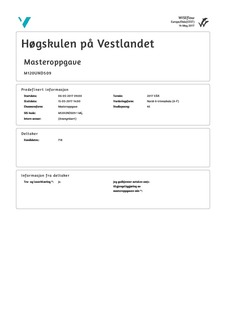| dc.contributor.author | Rakstang, Anna | |
| dc.date.accessioned | 2018-02-01T14:55:31Z | |
| dc.date.available | 2018-02-01T14:55:31Z | |
| dc.date.issued | 2017-05-15 | |
| dc.identifier.uri | http://hdl.handle.net/11250/2481619 | |
| dc.description | Masteroppgave i undervisningsvitenskap med fordypning i matematikk | en_GB |
| dc.description.abstract | Hensikten med denne masteroppgaven er å undersøke hvorvidt aspekter av kritisk demokratisk kompetanse kan identifiseres i elevers arbeid med matematisk modellering på mellomtrinnet. I denne oppgaven forstås begrepet modellering som prosessen der et problem fra virkeligheten løses ved hjelp av matematikk. Kritisk demokratisk kompetanse blir benyttet om kunnskapene som kreves for å se kritisk på matematikkens rolle i samfunnet, og konsekvensene av ulike matematiske anvendelser. Datainnsamlingen til denne studien ble gjennomført ved å la en gruppe på 14 elever fra mellomtrinnet arbeide med en modelleringsoppgave fra deres hverdag. Ved å tildele elevene oppgaven å finne ut hvor mye vann som går til dusjing, var ønsket å undersøke om elevene greide å se kritisk på matematikkens rolle i samfunnet underveis i arbeidet. Gjennomføringen av datainnsamlingen ble delt inn i tre faser, 1) introduksjonsøkt, 2) modelleringsøkt og 3) diskusjonsøkt. I introduksjonsøkta fikk elevene informasjon om temaet, og gjennomføringen. I modelleringsøkta fikk elevene modellere vannforbruk i forbindelse med dusjing. I diskusjonsøkta fikk elevene sammenligne resultatene fra modelleringen. Gruppa på 14 elever ble delt inn i mindre grupper, og stod fritt til å velge hvilken løsningsmetode de måtte ønske. Ved å benytte videoopptak av elevenes arbeid, kunne elevenes diskusjoner analyseres i etterkant, på søken etter aspekter av kritisk demokratisk kompetanse. Gjennom modelleringsarbeidet måtte elevene gjøre flere kritiske vurderinger og avgrensninger, og analysen av elevenes diskusjoner viste at de kom med en rekke refleksjoner underveis. Noen av disse refleksjonene kan kobles til utviklingen av kritisk demokratisk kompetanse, blant annet ved at elevene reflekterte rundt resultatene sine koblet opp mot miljøet og samfunnet. | en_GB |
| dc.description.abstract | The aim of this master thesis is to investigate if aspects of critical democratic competence can be identified when students in the upper primary school are working with a mathematical modelling task. The term modelling will in this thesis be used to describe the process where a problem from the real world is solved using mathematics. Critical democratic competence will be used about the skills students need for looking critically on the role of mathematics in society, and the consequences connected to mathematical applications. The collection of data for this study was accomplished by letting a group of 14 upper primary school students work with a modelling task from their everyday-life. By assigning the students the task of defining how much water is being used for showering, the wish was to see if the students were able to look critically on the role of mathematics in society, throughout their work. The data collection was carried out through three phases; 1) introductory session, 2) modelling session and 3) discussion session. In the introductory session the students were informed about the task at hand and how it was going to be carried out. In the modelling session the students were mathematically modelling the water used in showering. In the discussion session the students were given the chance to compare their results with each other. The group of 14 students was divided into smaller groups, and the groups were able to choose whatever method of solution they wanted. By video recording the students’ work, the students’ discussions could later be analyzed in order to identify aspects of critical democratic competence. Through working with the modelling task, the students had to make critical assessments and delimitations, and the analysis of the students’ discussions showed several reflections during the work. Some of these reflections can be linked to the development of critical democratic competence, through the students’ reflections about their results compared to the environment and the society. | en_GB |
| dc.language.iso | nob | en_GB |
| dc.publisher | Høgskulen på Vestlandet/ Western Norway University of Applied Sciences | en_GB |
| dc.rights | Attribution-NonCommercial-ShareAlike 3.0 Norway | * |
| dc.rights.uri | http://creativecommons.org/licenses/by-nc-sa/3.0/no/ | * |
| dc.subject.other | kritisk demokratisk kompetanse | en_GB |
| dc.subject.other | knowing | en_GB |
| dc.subject.other | matematisk modellering | en_GB |
| dc.subject.other | critical democratic competence | en_GB |
| dc.subject.other | mathematical modelling | en_GB |
| dc.title | Modellering og kritisk demokratisk kompetanse | en_GB |
| dc.title.alternative | Modelling and critical democratic competence | en_GB |
| dc.type | Master thesis | en_GB |

